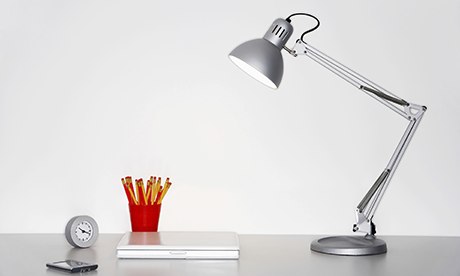Whether you're planning an empire or just doing a bit of work from home, here are some things you need to know

Working from home is on the rise. Photograph: Alamy
More than 3 million Britons have held a second job in the past six months and a further 1.5 million have launched their own business to supplement the income from their main job, according to research from Direct Line Home Business Insurance.
In the past 12 months alone, there has been a 34% increase in people setting up a business at home according to Freelancer.co.uk, a website for freelancers looking for more work or wanting specialist help. More than half of them have turned their bedrooms into their workplace, it says, with the kitchen the next most popular place to work and 9% even converting the garden shed into an office.
But whether it's your main business run from a dedicated office, or a side job you do at a desk under the stairs, there are some things you need to know to make it work.
1. Tell the tax man
You need to let HM Revenue & Customs know that you've started a business within three months of starting so you are set up to pay the appropriate National Insurance contributions and ready for self-assessment. If you're working alone you'll need to register with HMRC as a sole trader. Details of what you need to do when you start working for yourself are on the HMRC website.2. Get an accountant
It may sound like an unnecessary expense, but an accountant will be well-versed in knowing what costs you can expect to offset as business expenditure and may save you their fees several times over. If your business is being run from home you may be able to claim for some of the costs of running your property, for example part of your heating bills. You can find a local accountant via the ICAEW website, or ask friends for recommendations.3. Invest in a filing cabinet
"The revenue can come in and check you are keeping a sufficient level of records, particularly for new businesses," says Tim Walford-Fitzgerald, senior tax manager at the chartered accountants HW Fisher. "This will protect you if there's a revenue inquiry. There's a penalty of up to £3,000 if you don't keep proper records." Even if you're just selling stuff on eBay or running fitness classes at home you need to keep a record of the payments you receive. You don't need to set up a separate bank account as HMRC will check your personal bank account if necessary.4. Claim expenses
To keep the tax bill as low as possible you need to know what you can claim as legitimate business expenses. Some costs will be directly related to your business, such as a separate phone line or broadband. Others will have a dual purpose and split between personal and business use, such as:• Mortgage interest (but not the capital repayment) or rent if you're a tenant
• Running costs such as heat, light and water and TV licence if it's an essential tool
• Repairs to your home or adding a desk and bookcase to an existing room
• Council tax
• Car or van – for a list of allowances for petrol and running costs go to the HMRC website
"Don't be greedy by claiming 100% for business use or you will be liable for capital gains tax on that portion when you sell your home. Make sure you apportion the costs fairly and reasonably," says Walford-Fitzgerald.
"One method is to work out how many rooms you have in your home, and identify how many of those rooms you use for business and calculate how much time you actually use these rooms for business," says Emily Coltman, chief accountant at FreeAgent, which provides an online accounting system for freelancers and small businesses.
"For example, if you're a freelance decorator you might spend an hour or two a week writing up your books at home, if you're a self-employed PR consultant or web designer, you may well do the vast majority of your work at home."
Alternatively, you can claim a flat rate for your expenses based on the number of hours worked – currently the rate is £10 a month if you use it for 25 to 50 hours a month rising to £26 for 101 or more hours.
5. Insurance
You don't need to tell your home insurer if you're simply doing office work such as using a computer or telephone and doing paperwork. Do check that your office equipment is covered. LV, for instance, covers you for up to £5,000 of computer and other equipment as standard. If you have stock, business cash and tools stored at home you will need a commercial insurance policy. And if you have clients or employees visiting you at home you need to add public liability cover to your policy in case any of them have an accident at your home. This also applies if you're working in other people's homes as a plasterer for instance. It costs about £5 a month, according to Direct Line.6. Make time for yourself …
"Just because you're working from home, doesn't mean you have to be on call 24 hours a day. Designate working hours and break for lunch," says Bill Little of Freelancer.co.uk.7. ... and other people
If you find it lonely working from home, make phone calls rather than only communicating by email and push yourself to go to industry events and network.Tell family and friends. They can provide moral support and may have helpful tips or contacts. If you're selling goods, they may buy from you. And tell them the hours you keep so that they don't drop in and disrupt your working day.
http://www.theguardian.com/money/2013/oct/10/jobs-home-working-tips

No comments:
Post a Comment